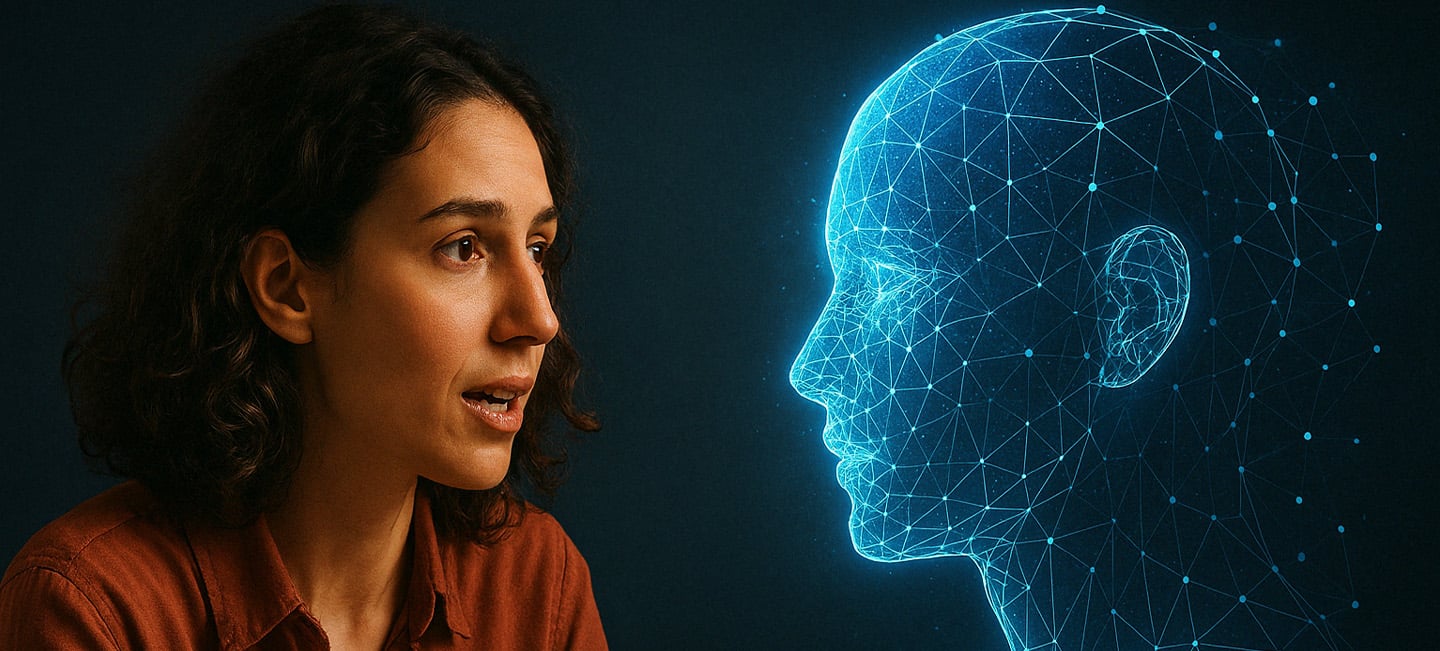Can artificial intelligence really teach communication skills? A reflection on empathy and the human voice
Mylena Vocal Coach has been personally involved for years in the development of advanced speech technologies, including artificial intelligence projects that seek to emulate the nuances of human communication. Her 30 years of experience allows her to closely observe the advances in these technologies, but also to recognize their limitations. If one treats voice as a mere piece of numerical data to be processed, something is lost. Indeed, one risks losing the very thing that makes every conversation authentic: the emotional vibration, the intention and that unique resonance that only a human being can perceive and return.
The idea of using AI to teach how to converse may seem useful, even ingenious: realistic simulations, instant feedback, 24/7 availability. An assistant that doesn’t judge and allows you to practice speaking, improve diction, learn language patterns, enrich vocabulary or prepare for interviews, debates, social interactions. All major Silicon Valley companies were involved in the idea, and they all asked Mylena for Feedback.
When AI is used for the purpose of conversation training, and not as an exercise to practice what is learned in real human interactions, it becomes tragicomic. Authentic human conversation is not made up of “correct” sentences or “appropriate” responses. It is made of intonations, of pauses, of silences that communicate more than words, of glances, of subtle perceptions, of vibrations. All of this is alive. It is emotional. It is human.
An AI can reproduce and recognize the form, but not the substance, which Mylena has been advocating for more than 10 years operate at the quantum level.
The real ability of an AI to understand human emotions
The AI, in its latest iterations, can even detect superficial signals: an altered tone, words associated with anger, facial expressions, vocal patterns. It can label, “this person seems sad,” “this sentence expresses joy,” but this is far from understanding the emotions involved. In fact understanding means first and foremost “feeling,” empathy.
Artificial intelligence does not have a body, a heart, or a lived experience. It has no wounds, no scars. It has never been afraid to speak in front of someone it loves, nor has it ever lowered its voice so as not to hurt. AI can mimic an emotion, it can respond empathetically, but it cannot create emotional resonance. It cannot truly resonate with the other person. It cannot live what is being said.
What will happen in the long run if all humans train with AI
If an entire generation relies on AI to learn to talk, who are they really learning to talk to? With a machine. A machine that doesn’t love them, judge them, or even hear them. You risk training people to “communicate” in a formally perfect but empty way. You create a facade conversation, where you say what you have learned, not what you feel.
In the long run we may be faced with human beings who can no longer recognize the authentic voice of another human being. Who cannot hold a true gaze or feel the vibration of genuine emotion. People who have “learned” to communicate, but have stopped relating.
Communication is not a code to decipher or an exercise in style. It is a reflection of who you are. If you delegate this to a machine, you risk losing the most intimate and powerful part of your humanity. If you feel the same way, contact us to find out how we can help you make your identity transparent through your voice.
Take the first step!
We offer world-class training to improve your personal, social and business communication skills. We specialize in presentations, leadership, media training, interviewing and Executive speaking.
Inborn Voice shapes tomorrow's leaders.
Book your first online Voice Assessment session by clicking the button below!
Any questions? We'll get back to you!
Are you looking to improve your voice with individual lessons, classes, or have any questions?
Fill out the form below!
and Mylena Vocal Coach:








Leave a Comment